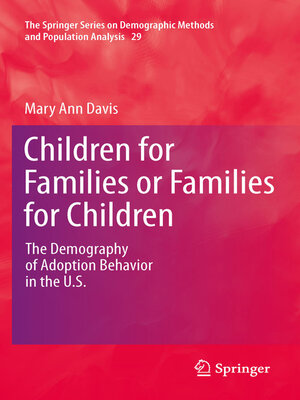Children for Families or Families for Children
ebook ∣ The Demography of Adoption Behavior in the U.S. · The Springer Series on Demographic Methods and Population Analysis
By Mary Ann Davis

Sign up to save your library
With an OverDrive account, you can save your favorite libraries for at-a-glance information about availability. Find out more about OverDrive accounts.
Find this title in Libby, the library reading app by OverDrive.



Search for a digital library with this title
Title found at these libraries:
| Library Name | Distance |
|---|---|
| Loading... |
Do adoptions provide children for families or families for children? This book analyzes the complex interactions between adopters and adoptees using historical and current data. Who are the preferred parents and children, both domestically and internationally? How do the types of adoptions-domestic adoptions, private and public through the foster care system, and intercountry adoptions-differ? Domestic trends include a shift to open adoptions and a notable increase in "hard to place", foster care adoptions-typically older, siblings, minorities, with physical, educational, or emotional challenges. Adoptive parents are increasingly all ages (including grandparents); all types of marriages (single, married and same-sex couples); all income levels, with subsidized adoptions for children who would otherwise remain in foster or institutional care. Intercountry adoptions have followed waves, pushed by wars and political or economic crises in the sending country, and pulled by the increasing demand from the U. S. Currently there is a decrease in intercountry adoptions from Asia and Eastern Europe with a possible fifth wave from Africa with the greatest number from Ethiopia. This is a resource for family sociologists, demographers, social workers, advocates for children and adoptive parents, as well as those who are interested in the continuing research in adoptions.







